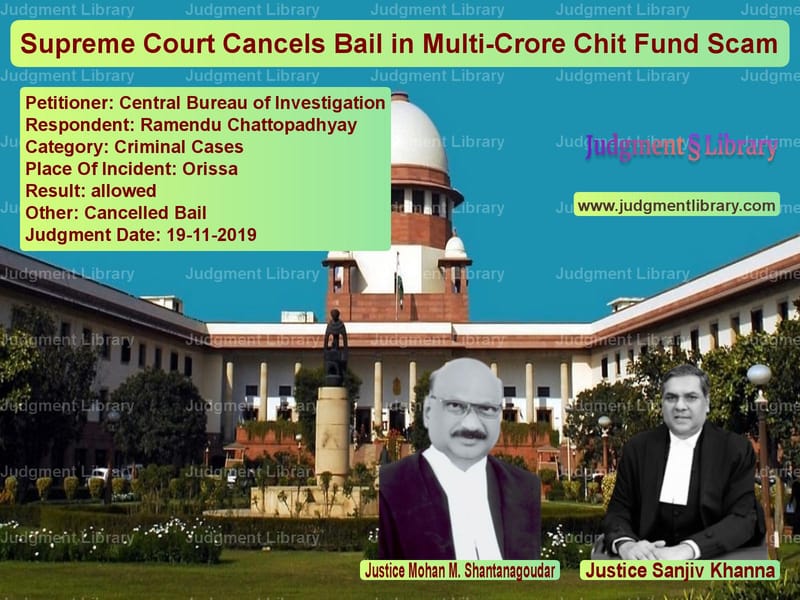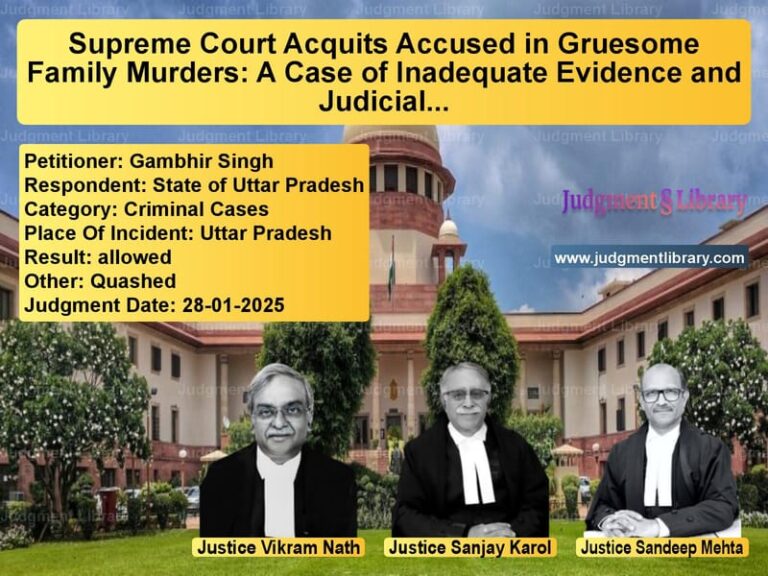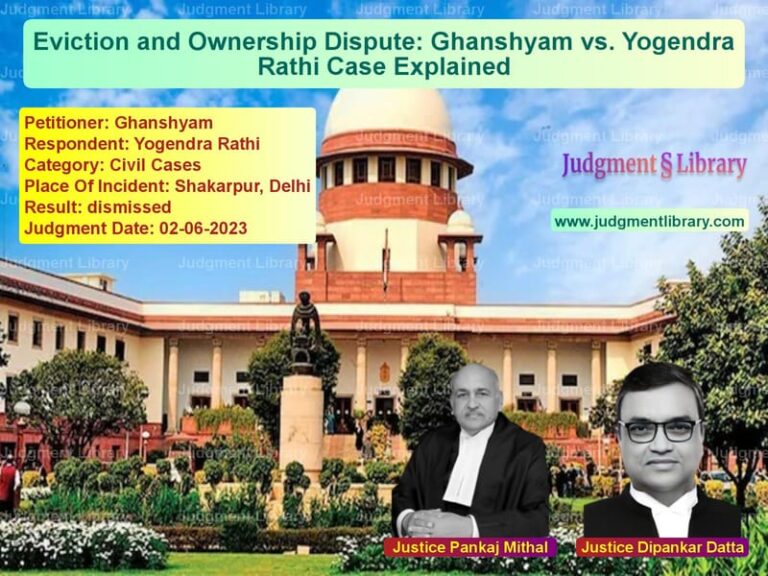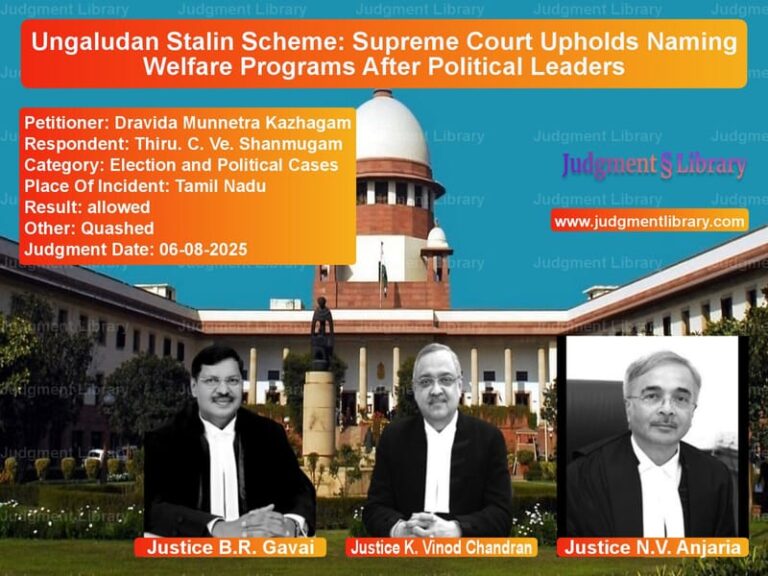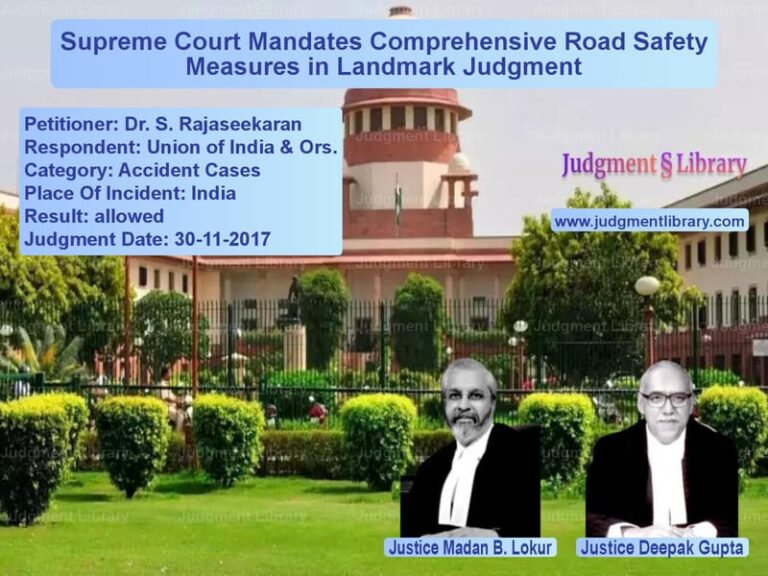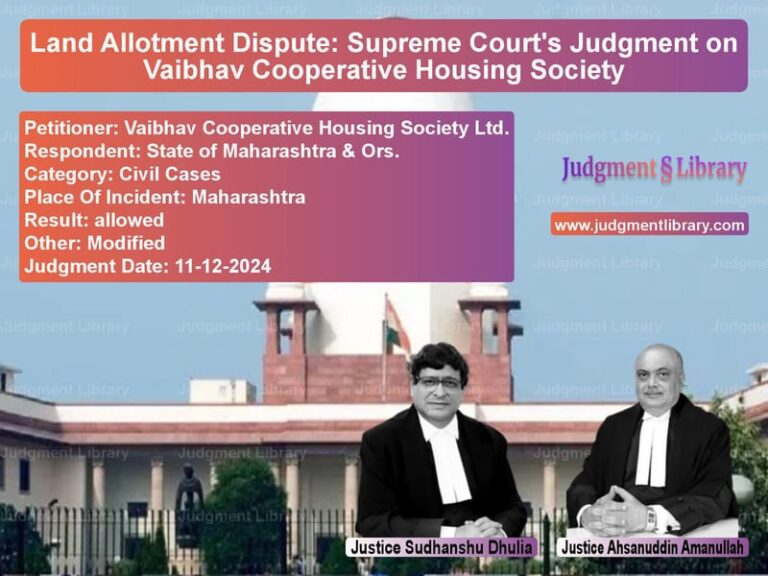Supreme Court Cancels Bail in Multi-Crore Chit Fund Scam
The Supreme Court of India, in its judgment dated November 19, 2019, delivered a significant ruling in the case of Central Bureau of Investigation vs. Ramendu Chattopadhyay. The case revolved around a multi-crore chit fund scam involving Tower Infotech Ltd., where investors were allegedly defrauded through fraudulent investment schemes. The ruling underscores the judicial approach toward economic offenses and the necessity to balance bail considerations with public interest.
Background of the Case
The case stemmed from an investigation into the operations of Tower Infotech Ltd., a company accused of running illegal collective investment schemes. The Central Bureau of Investigation (CBI) registered an FIR against the company and its directors, including Ramendu Chattopadhyay and Ashis Chatterjee, following allegations that they collected over ₹255.91 crores from the public, promising high returns but failing to repay ₹15.69 crores.
The accused were charged under Sections 120B, 420, and 409 of the Indian Penal Code, as well as Sections 4 and 6 of the Prize Chits and Money Circulation Schemes (Banning) Act, 1978. The key allegations included misrepresentation of regulatory approvals, misleading investors with fraudulent claims, and siphoning off large amounts of money.
Petitioner’s (CBI) Arguments
- The High Court of Orissa granted bail to the accused without assigning proper reasons, despite the serious nature of the financial fraud.
- The accused, as the Chief Managing Director of Tower Infotech Ltd., played a key role in inducing investors and misusing funds.
- The accused had signed certificates and other documents misleading investors about regulatory approvals.
- The accused was released on interim bail multiple times but failed to assist in the liquidation of company assets to repay investors.
- Economic offenses of this magnitude require strict judicial scrutiny, as they undermine public trust in financial systems.
Respondent’s (Ramendu Chattopadhyay) Arguments
- The accused had not misused his liberty while on bail and was cooperating with the investigation.
- The accused was not obstructing the liquidation of company assets.
- The bail conditions imposed by the High Court ensured that the accused would not interfere with the ongoing investigation.
Supreme Court’s Observations
- The accused was the founding director and key decision-maker of the company, actively involved in fraudulent activities.
- The accused misled investors by misrepresenting the company’s financial status and regulatory approvals.
- During his interim bail periods, the accused failed to cooperate in the liquidation of company assets, delaying investor repayment.
- The accused played a central role in running the chit fund scheme and misappropriating investor funds.
- Economic offenses must be treated with the highest level of scrutiny to prevent further public deception.
Final Judgment
The Supreme Court overturned the High Court’s decision and ordered the cancellation of bail for the accused. Key directives included:
- The accused must surrender immediately to law enforcement authorities.
- The One-Man Committee appointed to oversee the liquidation of company assets should continue its operations.
- Investigating agencies must ensure that the total liability of the accused company is determined to facilitate investor repayment.
Impact of the Judgment
- Strengthens Judicial Oversight in Financial Frauds: The ruling reinforces the judiciary’s role in preventing misuse of bail provisions in economic offenses.
- Protects Investor Interests: The decision highlights the need to prioritize investor compensation in large-scale financial fraud cases.
- Enhances Accountability in Chit Fund Schemes: The ruling serves as a deterrent against companies engaging in unauthorized collective investment schemes.
Conclusion
The Supreme Court’s decision in Central Bureau of Investigation vs. Ramendu Chattopadhyay establishes a significant precedent in financial fraud cases, ensuring that accused individuals in large-scale economic offenses are subject to rigorous judicial scrutiny. The ruling reinforces the importance of balancing the rights of the accused with the broader public interest in preventing financial scams.
Petitioner Name: Central Bureau of Investigation.Respondent Name: Ramendu Chattopadhyay.Judgment By: Justice Mohan M. Shantanagoudar, Justice Sanjiv Khanna.Place Of Incident: Orissa.Judgment Date: 19-11-2019.
Don’t miss out on the full details! Download the complete judgment in PDF format below and gain valuable insights instantly!
Download Judgment: Central Bureau of In vs Ramendu Chattopadhya Supreme Court of India Judgment Dated 19-11-2019.pdf
Direct Downlaod Judgment: Direct downlaod this Judgment
See all petitions in Fraud and Forgery
See all petitions in Money Laundering Cases
See all petitions in Bail and Anticipatory Bail
See all petitions in Corporate Compliance
See all petitions in unfair trade practices
See all petitions in Judgment by Mohan M. Shantanagoudar
See all petitions in Judgment by Sanjiv Khanna
See all petitions in allowed
See all petitions in Cancelled Bail
See all petitions in supreme court of India judgments November 2019
See all petitions in 2019 judgments
See all posts in Criminal Cases Category
See all allowed petitions in Criminal Cases Category
See all Dismissed petitions in Criminal Cases Category
See all partially allowed petitions in Criminal Cases Category

